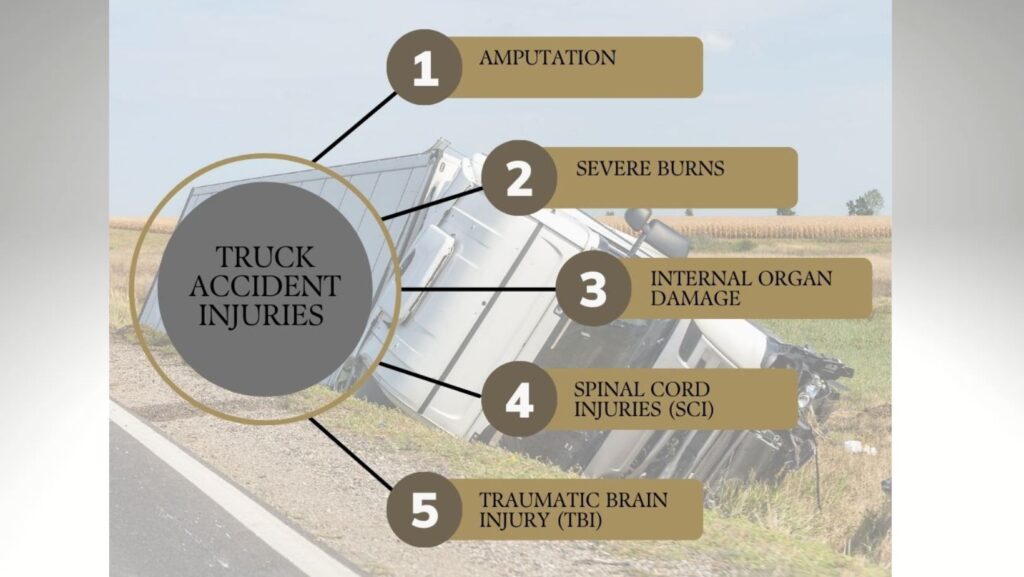Truck accidents are one of the most devastating types of crashes on the road. These collisions are particularly scary due to the truck’s immense size and force, which frequently results in permanent injuries.
Truck accident lawyers are essential in helping victims deal with the aftermath and get justice, as victims not only endure excruciating physical agony but also long-term emotional, financial, and medical difficulties.
Let’s look at some of the most life-altering injuries that occur due to a truck accident.
Amputation
Severe truck accidents frequently result in amputation, particularly when a limb is crushed or severed during the collision. A person’s ability to walk, drive, and carry out basic everyday duties can all be significantly impacted by losing a limb. Although rehabilitation and prosthetic limbs can be helpful, adjusting to life without a limb is challenging.
Amputation can have an equally difficult emotional toll, with many patients feeling helpless, frustrated, and mournful. It can be psychologically stressful to adjust to a new way of life, particularly for people whose careers depend on their physical abilities. The costly nature of prosthetics and ongoing therapy adds to the financial constraints in addition to the emotional healing process.
Severe Burns
Severe burns are among the most excruciating injuries that truck accident victims may experience. These burns may result in nerve damage, disfigurement, and lifelong scarring, necessitating numerous operations and skin grafts. People who suffer from severe burns may be physically disabled for a long time, including losing the ability to use the damaged parts.
Severe burns have serious emotional and psychological effects in addition to the physical ones.

Because of their deformities, victims frequently experience trauma, social isolation, and feelings of humiliation. The healing process takes a long time, and many burn sufferers have trouble going back to their regular lives, which includes problems finding work and interacting with others.
Internal Organ Damage
Internal organs like the heart, lungs, liver, and kidneys can sustain serious damage in truck crashes. Organ failure, internal bleeding, or chronic health issues requiring substantial medical intervention are all possible outcomes of the trauma. Organ transplants, which have their own set of difficulties, may be necessary for victims in certain situations.
Internal organ injury rehabilitation frequently entails prolonged hospital stays, surgeries, and ongoing medical attention. Many victims experience persistent health problems, such as chronic pain, exhaustion, and the requirement for regular medical monitoring, even after they have recovered. Internal organ injuries have far-reaching effects due to the cost of this care and the disruption to a victim’s employment.
Spinal Cord Injuries (SCI)
Among the worst consequences of truck accidents is a spinal cord injury. Partial or total paralysis from spinal cord damage might prevent a person from walking or moving around freely. Some patients require help with everyday tasks, and their injuries frequently necessitate lifetime care.

In addition to the physical toll, spinal cord injuries have a catastrophic emotional impact. While they adjust to their new situation, victims may feel depressed, anxious, and bereaved. Due to the continuous expense of medical treatment and specialized equipment, many victims experience severe financial hardships, and long-term rehabilitation is required.
Traumatic Brain Injury (TBI)
Truck accidents can also result in traumatic brain injuries (TBI), which can range from minor concussions to serious brain trauma. Cognitive challenges, like memory loss, difficulty focusing, or personality changes, can result from even seemingly minor TBIs.
A victim’s life may be significantly changed by serious brain injuries that result in coma or irreversible brain damage.
Recovering from a traumatic brain injury is a drawn-out procedure that necessitates intensive therapy. While psychological support, cognitive therapy, and speech therapy may help victims regain some of their abilities, many may live with the effects for the rest of their lives. Resuming regular activities like dating, working, and social engagements can be challenging for victims.
